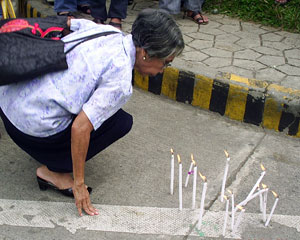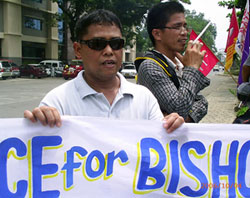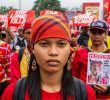 The brutal murder of IFI Bishop Alberto Ramento has galvanized the resolve of the church�s priests and followers in Davao City, vowing to continue the pro-people struggles of a beloved man who devoted his life to the masses. Davao Today managing editor Cheryll D. Fiel reports.
The brutal murder of IFI Bishop Alberto Ramento has galvanized the resolve of the church�s priests and followers in Davao City, vowing to continue the pro-people struggles of a beloved man who devoted his life to the masses. Davao Today managing editor Cheryll D. Fiel reports.
DAVAO CITY — When Paul Daguplo, a parishioner of the diocese here of the Iglesia Filipina Independiente, received a text message on the morning of Oct. 5 that former Supreme Bishop Alberto Ramento was murdered inside his convent in Tarlac, he thought — and hoped � that it was just a prank.
Upon hearing it in the news later in the day, Paul still could not believe that such brutality could befall the bishop he personally knew.
 But what angered him was the statement of Tarlac police that easily dismissed the murder of the bishop as a “plain and simple case of robbery.”
But what angered him was the statement of Tarlac police that easily dismissed the murder of the bishop as a “plain and simple case of robbery.”
An enraged Daguplo was among those who showed up at a prayer rally at the Freedom Park the next day, denouncing the murder and calling for an end to the killings of political activists and church workers in the country.
Watching the people at the park, a passerby may think that a mass was going on. There were flowers on a white table and priests and bishops in their religious garb. The only difference are the signs and streamers screaming for justice for the slain bishop.
Music from a guitar and a flute drifted in the air. It refused to be buried in the ambient sound of revving jeepney engines. The music came from a group of young pastors, singing a few songs in preparation for the ceremony. From across the street, two Armalite-clutching members of the military�s Task Force Davao (TFD) watched the assembly.
There was a prevailing sense of loss and a sense of some intense but subdued feeling on the faces of those who joined the rally. Perhaps a lot of them felt like Daguplo, who had been unable to get enough sleep that night.
Lament, he said, kept him awake. And anger, too, at the thought that even a much-revered man like Ramento would suffer such horrible violence.
Daguplo recalled it was just four months ago when Ramento came to Davao City. There was a gathering for the Supreme Council of Bishops held in Makilala town in North Cotabato.
After the event, the IFI bishops met at the cathedral along F. Torres. Over a fellowship merienda of coffee and pandesal with some members of the local media, Ramento and current Supreme Bishop Godofredo David announced their position on issues which, they said, they had discussed during the two-day reflection in Makilala.
In a video clip shown on a local TV news, Ramento was speaking as head of the council, citing the position of the IFI Supreme Council of Bishops that President Gloria Macapagal-Arroyo must step down due to lingering questions about the legitimacy of her presidency.
Ramento also talked of continuing harassments of political activists and members of the Church.
He said he was himself a victim of communist tagging when all he had done was show support to the striking workers of Hacienda Luisita. “If seeking justice to the poor is called communism, then communism must be good,” Ramento was quoted in that local TV news footage as saying.
His friends and colleagues are aghast at the loss of a man of such principle. “The church could not just accept the Tarlac police�s statement on Ramento’s death. We know who Ramento is. He is active in the struggle to give life a little more dignity,” said Bishop Delfin Callao Jr. at the rally, his voice quivering.
Ramento had received death threats and was among accused of rebellion by the Arroyo administration � all these facts make the hasty statement of the police puzzling and suspect, Callao said.
The Promotion of Church People’s Response (PCPR), which identifies its group as an ecumenical political organization of church people, counts Ramento as the 24th victim of killings among the clergy who were apparently killed for their political convictions and involvement in social movements. Six of them were from Mindanao.
“We share the people’s rage even as we bow our heads in prayers,” the PCPR�s secretary general, the Reverend Ariel Baladjay of the UCCP, said. “We hold our hands over the continuing death threats and harassments to a number of bishops, priests, lay workers and the people who bravely took the side of life against the instruments of death.”
Three days after the killing of Ramento, an IFI priest based in Cagayan de Oro City received a death threat through a text message. The PCPR said the threat came from cellphone number 09203546270 and that it said: “Fr. Ablon, even the supreme bishop was killed. We will make you an example here in Cagayan de Oro.”
Fr. Antonio Ablon is, like Ramento, also an outspoken critic of the Arroyo government and has been receiving death threats like other activist priests and pastors.
He is also a member of the national council of the PCPR and secretary-general of the human-rights group Karapatan in Northern Mindanao.
Other IFI priests who received death threats or were harassed are Fr. Terry Revollido, a PCPR and Bayan leader and faculty member of the Aglipayan seminary in Pangasinan; Fr. Romeo Tagud, PCPR and Bayan Negros; Fr. Marco Sulayao, PCPR and Bayan Panay; and Fr. Sonny Teleron, PCPR and Bayan in Western Mindanao.
What’s with the IFI and Why are they subjected to this type of persecution?
Daguplo, who used to be a sacristan, traces the roots of the Church to the time when the clergy in the country was still dominated by Spanish friars.
Every IFI priest has an avowed statement never to leave the side of the poor, so that he is always at the forefront of peoples’ struggles. He is active in human rights advocacy, anti-corruption and campaigns against the policies of the government that are detrimental to the people.
For instance, the IFI�s cathedral-convent in Davao City has welcomed to its doors the workers of banana plantations in Compostela Valley and their families as they hold protests at the Department of Labor and Employment (DOLE) and at the doorsteps of the company.
Ramento’s death, Callao said, will be an inspiration to continue IFI�s tasks with the poor. This is the only way for them, he added, to become �truly a church� and “to be firm and steadfast amid continuing persecution.” (Cheryll D. Fiel/davaotoday.com)
Extrajudicial Killings









